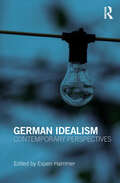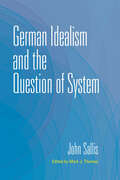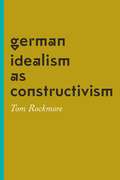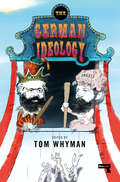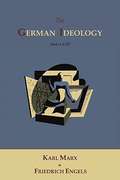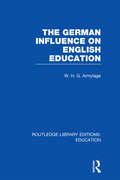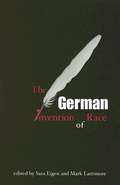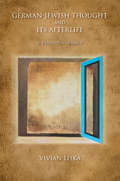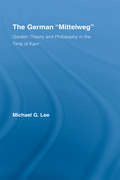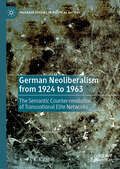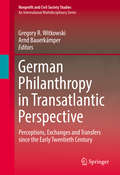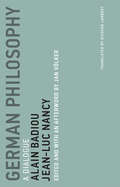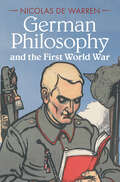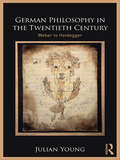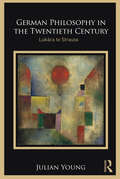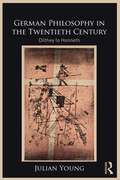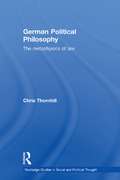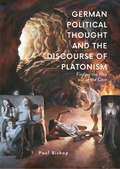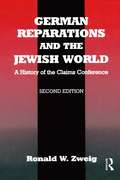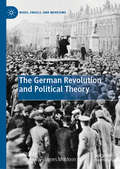- Table View
- List View
German Idealism: Contemporary Perspectives
by Espen HammerThis outstanding collection of specially commissioned chapters examines German idealism from several angles and assesses the renewed interest in the subject from a wide range of fields. Including discussions of the key representatives of German idealism such as Kant, Fichte and Hegel, it is structured in clear sections dealing with: metaphysics the legacy of Hegel’s philosophy Brandom and Hegel recognition and agency autonomy and nature the philosophy of German romanticism. Amongst other important topics, German Idealism: Historical and Philosophical Perspectives addresses the debates surrounding the metaphysical and epistemological legacy of German idealism; its importance for understanding recent debates in moral and political thought; its appropriation in recent theories of language and the relationship between mind and world; and how German idealism affected subsequent movements such as romanticism, pragmatism, and critical theory. Contributors: Espen Hammer, Stephen Houlgate, Sebastian Gardner, Paul Redding, Andrew Bowie, Richard Eldridge, Jay Bernstein, Frederick Beiser, Paul Franks, Robert Pippin, Fred Rush, Manfred Frank, Terry Pinkard, Robert Stern
German Idealism and the Concept of Punishment
by Joseph J. Kominkiewicz Frances BrownAgainst the background of early modernism - a period that justified punishment by general deterrence - Kant is usually thought to represent a radical turn towards retributivism. For Kant, and later for Fichte and Hegel, a just punishment respects the humanity inherent in the criminal, and serves no external ends - it is instituted only because the criminal deserves it. In this original study, Jean-Christophe Merle uses close analysis of texts to show that these philosophers did not in fact hold a retributivist position, or even a mixed position; instead he traces in their work the gradual emergence of views in favour of deterrence and resocialisation. He also examines Nietzsche's view that morality rests on the rejection of retribution. His final chapter offers a challenge to the retributivist position, and a defence of resocialisation, in the context of current legal theory and practice concerning the punishment of crimes against humanity.
German Idealism and the Jew: The Inner Anti-Semitism of Philosophy and German Jewish Responses
by Michael MackIn German Idealism and the Jew, Michael Mack uncovers the deep roots of anti-Semitism in the German philosophical tradition. While many have read German anti-Semitism as a reaction against Enlightenment philosophy, Mack instead contends that the redefinition of the Jews as irrational, oriental Others forms the very cornerstone of German idealism, including Kant's conception of universal reason. Offering the first analytical account of the connection between anti-Semitism and philosophy, Mack begins his exploration by showing how the fundamental thinkers in the German idealist tradition—Kant, Hegel, and, through them, Feuerbach and Wagner—argued that the human world should perform and enact the promises held out by a conception of an otherworldly heaven. But their respective philosophies all ran aground on the belief that the worldly proved incapable of transforming itself into this otherworldly ideal. To reconcile this incommensurability, Mack argues, philosophers created a construction of Jews as symbolic of the "worldliness" that hindered the development of a body politic and that served as a foil to Kantian autonomy and rationality. In the second part, Mack examines how Moses Mendelssohn, Heinrich Heine, Franz Rosenzweig, and Freud, among others, grappled with being both German and Jewish. Each thinker accepted the philosophies of Kant and Hegel, in varying degrees, while simultaneously critiquing anti-Semitism in order to develop the modern Jewish notion of what it meant to be enlightened—a concept that differed substantially from that of Kant, Hegel, Feuerbach, and Wagner. By speaking the unspoken in German philosophy, this book profoundly reshapes our understanding of it.
German Idealism and the Question of System (The Collected Writings of John Sallis)
by John SallisThis volume in the Collected Writings of John Sallis presents his lecture course on German Idealism, tracing its development from the reception of Kant through the works of Fichte and Schelling. With insightful interpretations of key texts, John Sallis demonstrates the enduring power of post-Kantian thought—especially with respect to freedom, the relation of subject to object, and the role of the imagination. He shows that what underlies the development of German Idealism is a concern with the question of system and the nature of philosophy itself.The book begins with a treatment of Kant's philosophy and its new beginning. It then discusses the initial reception of Kant's philosophy, showing how criticisms of Kant set the stage for the subsequent development of German Idealism. The central chapters focus on Fichte, first introducing his central philosophical project (the Wissenschaftslehre) and then carefully analyzing its implementation in the 1794 Grundlage. The final chapters treat Schelling's early and middle philosophy, including the 1800 System of Transcendental Idealism and his famous 1809 treatise on freedom.Beyond its insights into the thought of German Idealism, the book is distinctive for the clarity of Sallis's exposition, his attention to the implications for philosophy today, and the sense of wonder he evokes in his readers. Because of these features, the book will be of interest to general readers as well as specialists in German philosophy.
German Idealism as Constructivism
by Tom RockmoreGerman Idealism as Constructivism is the culmination of many years of research by distinguished philosopher Tom Rockmore—it is his definitive statement on the debate about German idealism between proponents of representationalism and those of constructivism that still plagues our grasp of the history of German idealism and the whole epistemological project today. Rockmore argues that German idealism—which includes iconic thinkers such as Kant, Fichte, Schelling, and Hegel—can best be understood as a constructivist project, one that asserts that we cannot know the mind-independent world as it is but only our own mental construction of it. Since ancient Greece philosophers have tried to know the world in itself, an effort that Kant believed had failed. His alternative strategy—which came to be known as the Copernican revolution—was that the world as we experience and know it depends on the mind. Rockmore shows that this project was central to Kant’s critical philosophy and the later German idealists who would follow him. He traces the different ways philosophers like Fichte, Schelling, and Hegel formulated their own versions of constructivism. Offering a sweeping but deeply attuned analysis of a crucial part of the legacy of German idealism, Rockmore reinvigorates this school of philosophy and opens up promising new avenues for its study.
German Idealism's Trinitarian Legacy
by Dale M. SchlittDale M. Schlitt presents a study of trinitarian thought as it was understood and debated by the German Idealists broadly—engaging Schelling's philosophical interpretations of Trinity as well as Hegel's—and analyzing how these Idealist interpretations influenced later philosophers and theologians. Divided into different sections, one considers nineteenth-century central Europeans Philipp Marheineke, Isaak August Dorner, and Vladimir Sergeyevich Solovyov under the rubric "testimonials." Another section studies twentieth-century Germans Karl Barth, Karl Rahner, and Wolfhart Pannenberg, who share "family resemblances" with the Idealists, and a third addresses the work of twentieth- and twenty-first century Americans, Robert W. Jenson, Catherine Mowry LaCugna, Joseph A. Bracken, and Schlitt himself, whose work reverberates with what Schlitt terms "transatlantic Idealist echoes." The book concludes with reflection on the overall German Idealist trinitarian legacy, noting several challenges it offers to those who will pursue creative trinitarian reflection in the future.
The German Ideology: A New Abridgement
by Karl MarxA new abridgement of Marx and Engels&’s 1846 reckoning with the philosophical tradition, edited and with an introduction by philosopher Tom Whyman.Edited and with an introduction by philosopher Tom Whyman, this new abridged version The German Ideology sheds new light on one of the most difficult, disputed texts in Marx&’s oeuvre.Written in 1846 and subsequently abandoned by Marx and Engels, only to be rescued in the 1930s by researchers in the USSR, The German Ideology is the high point of Marx&’s philosophical thought: a brilliantly insightful, still thrillingly radical work of materialist philosophical therapy. Yet there remains no wholly satisfactory stand-alone version in English, with only a heavily abridged 1970 edition edited by C.J. Arthur, or a facsimile edition taken from Vol. 5 of the Marx-Engels Collected Works, which does not include satisfactory scholarly notes, currently available. In this new Repeater Classics edition, Tom Whyman seeks to remedy this. By expanding on generally-available abridgements to include the bulk of the section on Max Stirner, as well as amending the translation, adding notes and providing a new critical introduction, this new edition of The German Ideology will allow non-specialists to engage with this critical work for the first time. At a time when interest in Marx's work is increasing, as people look for an alternative to our currently failing political system, this new edition of The German Ideology will bring Marx's most substantial vision of what communism might actually be like to a whole new audience.
The German Ideology
by Karl Marx Friedrich Engels2011 Reprint of 1939 Edition. Parts I & III of "The German Ideology". Full facsimile of the original edition, not reproduced with Optical Recognition Software. Originally published by the Marx-Engels Institute in Moscow in 1939. "The German Ideology" was written by Karl Marx and Friedrich Engels circa 1846, but published later. The original edition was divided into three parts. Part I, the most significant, is perhaps the classic statement of the Marxist theory of history and his much cited "materialist conception of history". Since its first publication, Marxist scholars have found Part I "The German Ideology" particularly valuable since it is perhaps the most comprehensive statement of Marx's theory of history stated at such length and detail. Part II consisted of many satirically written polemics against Bruno Bauer, other Young Hegelians, and Max Stirner. These polemical and highly partisan sections of the "German Ideology" have not been reproduced in this edition. We reprint Parts I & Parts III only. Part III treats Marx & Engels' conception of true socialism and is reprinted in its entirety. Part II has not been reprinted in this edition in order to produce a small and inexpensive book which contains the gist of the "German Ideology". Appendix contains the "Theses on Feuerbach." Index of authors, with scholarly citations and footnotes.
German Influence on English Education (Routledge Library Editions: Education)
by W H ArmytageThis book traces the impact of German educationists, such as Froebel and Herbart, on practice in Britain while stressing the important and lasting influence of German scientists, technologists, philosophers, sociologists and historians on our educational system. This record of interplay between the two countries shows not only the influence of German innovations but also the effect on British education of the many German émigrés in the last two hundred years.
The German Invention of Race (SUNY Series, Philosophy and Race)
by Sara Eigen Mark LarrimoreIlluminates the emergence of race as a central concept in philosophy and the social sciences.
German-Jewish Thought and Its Afterlife: A Tenuous Legacy
by Vivian LiskaInGerman-Jewish Thought and Its Afterlife,Vivian Liska innovatively focuses on the changing form, fate and function of messianism, law, exile, election, remembrance, and the transmission of tradition itself in three different temporal and intellectual frameworks: German-Jewish modernism, postmodernism, and the current period. Highlighting these elements of theJewish tradition in the works of Franz Kafka, Walter Benjamin, Gershom Scholem, Hannah Arendt, and Paul Celan, Liska reflects on dialogues and conversations between themandonthereception of their work.She shows how this Jewish dimension of their writings is transformed, but remains significant in the theories of Maurice Blanchot and Jacques Derrida and how it is appropriated, dismissed or denied by some of the most acclaimed thinkers at the turn of the twenty-first century such as Giorgio Agamben, Slavoj i ek, and Alain Badiou.
German Migrants in Post-War Britain: An Enemy Embrace (British Politics and Society)
by Dr Inge Weber-Newth Johannes-Dieter SteinertBoth timely and topical, with 2005 marking the 60th anniversary of the end of the Second World War, this unique book examines the little-known and under-researched area of German migration to Britain in the immediate post-war era. Authors Weber-Newth and Steinert analyze the political framework of post-war immigration and immigrant policy, and the complex decision-making processes that led to large-scale labour migration from the continent. They consider: * identity, perception of self and others, stereotypes and prejudice* how migrants dealt with language and intercultural issues* migrants' attitudes towards national socialist and contemporary Germany* migrants' motivation for leaving Germany* migrants' initial experiences and their reception in Britain after the war, as recalled after 50 years in the host country, compared to their original expectations. Based on rich British and German governmental and non-governmental archive sources, contemporary newspaper articles and nearly eighty biographically–oriented interviews with German migrants, this outstanding volume, a must-read for students and scholars in the fields of social history, sociology and migration studies, expertly encompasses political as well as social-historical questions and engages with the social, economic and cultural situation of German immigrants to Britain from a life-historical perspective.
German Migrants in Post-War Britain: An Enemy Embrace (British Politics and Society)
by Dr Inge Weber-Newth Johannes-Dieter SteinertBoth timely and topical, with 2005 marking the 60th anniversary of the end of the Second World War, this unique book examines the little-known and under-researched area of German migration to Britain in the immediate post-war era. Authors Weber-Newth and Steinert analyze the political framework of post-war immigration and immigrant policy, and the complex decision-making processes that led to large-scale labour migration from the continent. They consider:* identity, perception of self and others, stereotypes and prejudice* how migrants dealt with language and intercultural issues* migrants' attitudes towards national socialist and contemporary Germany* migrants' motivation for leaving Germany* migrants' initial experiences and their reception in Britain after the war, as recalled after 50 years in the host country, compared to their original expectations.Based on rich British and German governmental and non-governmental archive sources, contemporary newspaper articles and nearly eighty biographically–oriented interviews with German migrants, this outstanding volume, a must-read for students and scholars in the fields of social history, sociology and migration studies, expertly encompasses political as well as social-historical questions and engages with the social, economic and cultural situation of German immigrants to Britain from a life-historical perspective.
The German Mittelweg: Garden Theory and Philosophy in the Time of Kant
by Michael G. LeeIn the 1790s, a close-knit group of German philosophers published several garden theory texts. These works are unique in that a close-knit group of philosophers had never before--and has not since--produced so many works on the topic of garden design. In essence, this cohort sought to imbue the most visionary concepts that had been inherited from the German garden tradition with the intellectual resources that were newly available through Kant’s critical philosophy. The most important of these concepts was the prescription for a new Mittelweg, or "middle path," garden that would mediate between the perceived excesses of French formalism and the English picturesque. In close analysis, the author demonstrates that Kant used similar "middle path" techniques in the design of his own "critical path" between dogmatism and skepticism. This similarity is most apparent when he uses topographical metaphors to describe the organizational principles of his system. By interpreting Kant’s topographical metaphors in relation to contemporary garden theories, this book offers new insights into the structural similarities between his "critical path" and the German garden’s "middle path" between French formalism and the English picturesque.
German Neoliberalism from 1924 to 1963: The Semantic Counter-revolution of Transnational Elite Networks (Palgrave Studies in Political History)
by Arne I. KäthnerThis book offers an in-depth study of German neoliberalism between 1924 and 1963, arguing that a neoliberal network was established in the interwar period, decades before elite networks in Great Britain and the United States fostered the ‘neoliberal revolution’ of the Thatcher and Reagan administrations. The author shows how this network strongly influenced societal developments in the 1950s and set a precedent for neoliberal projects in other countries. This success was largely due to the deliberate and strategic reorganisation of the semantic field: abandoning or reacquiring ‘abused’ concepts, challenging existing meanings, or introducing new concepts to the political scene. The book examines the Aktionsgemeinschaft Soziale Marktwirtschaft (ASM), an early neoliberal Think Tank founded in 1953 and led by Alexander Rüstow, which became an influential political actor in post-war West Germany. The author adopts a decidedly transnational approach linking and contrasting inner-German debates with those taking place transnationally among neoliberal proponents in the Mont Pèlerin Society. More than just a political study of ideologies, this book provides a historical account of the conceptual struggles over neoliberalism, the actors who engaged in them, the spheres in which they took place, and the semantic means and conceptual strategies employed, providing useful insights for scholars of German and political history, as well as political science more generally.
German Philanthropy in Transatlantic Perspective
by Gregory R. Witkowski Arnd BauerkämperThis volume examines philanthropic practices against the backdrop of the continuities, disruptions and changes in twentieth century German socio-political relations. It presents a differentiated understanding of the relationship between philanthropy and civil society that traces this connection from Germany's first democracy, the Weimar Republic, through the Nazi dictatorship and Soviet-style rule in Communist East Germany to the stable democracy of the Federal Republic of Germany. While concentrating on Germany, this volume places German philanthropy in a triangular relationship with the United States and the developing world, primarily through Africa. In particular, the contributions to the book demonstrate that despite many transatlantic exchanges between German and American philanthropic organizations, these relationships should not be reduced to bilateral exchanges but rather seen in the context of a globalizing world. More generally, this transnational study is a reminder that philanthropic activities need to be placed into their specific historical contexts. Such an analytical framework allows for more dynamic understanding of the meaning of philanthropy in society, illustrating both enduring and changing practices.
German Philosophy: A Dialogue (Untimely Meditations #11)
by Alain Badiou Jean-Luc NancyTwo eminent French philosophers discuss German philosophy—including the legacy of Kant, Hegel, Nietzsche, Adorno, Fichte, Marx, and Heidegger—from a French perspective. In this book, Alain Badiou and Jean-Luc Nancy, the two most important living philosophers in France, discuss German philosophy from a French perspective. Written in the form of a dialogue, and revised and expanded from a 2016 conversation between the two philosophers at the Universität der Künste Berlin, the book offers not only Badiou's and Nancy's reinterpretations of German philosophers and philosophical concepts, but also an accessible introduction to the greatest thinkers of German philosophy. Badiou and Nancy discuss and debate such topics as the legacies of Kant, Hegel, and Marx, as well as Nietzsche, Adorno, Fichte, Schelling, and the unavoidable problem of Heidegger and Nazism. The dialogue is contentious, friendly, and often quotable, with strong—at times passionate—positions taken by both Badiou and Nancy, who find themselves disagreeing over Kant, for example, and in unexpected agreement on Marx, for another. What does it mean, then, to conduct a dialogue on German philosophy from a French perspective? As volume editor Jan Völker observes, “German philosophy” and “French philosophy” describe complex constellations that, despite the reference to nation-states and languages, above all encompass shared concepts and problems—although these take a range of forms. Perhaps they can reveal their essential import only in translation.
German Philosophy and the First World War
by Nicolas de WarrenHow did the First World War, the so-called 'Great War' - widely seen on all sides as 'the war to end all wars' - impact the development of German philosophy? Combining history and biography with astute philosophical and textual analysis, Nicolas de Warren addresses here the intellectual trajectories of ten significant wartime philosophers: Ernst Bloch, Martin Buber, Ernst Cassirer, Hermann Cohen, György Lukács, Martin Heidegger, Edmund Husserl, Franz Rosenzweig, Max Scheler and Georg Simmel. In exploring their individual works written during and after the War, the author reveals how philosophical concepts and new forms of thinking were forged in response to this unprecedented catastrophe. In reassessing standardized narratives of German thought, the book deepens and enhances our understanding of the intimate and complex relationship between philosophy and violence by demonstrating how the 1914-18 conflict was a crucible for ways of thinking that still define us today.
German Philosophy in the Twentieth Century: Weber to Heidegger
by Julian YoungThe course of German philosophy in the twentieth century is one of the most exciting, diverse and controversial periods in the history of human thought. It is widely studied and its legacy hotly contested. In this outstanding introduction, Julian Young explains and assesses the two dominant traditions in modern German philosophy – critical theory and phenomenology – by examining the following key thinkers and topics: Max Weber’s setting the agenda for modern German philosophy: the ‘rationalization’ and ‘disenchantment’ of modernity resulting in ‘loss of freedom’ and ‘loss of meaning’ Horkheimer and Adorno: rationalization and the ‘culture industry’ Habermas’ defence of Enlightenment rationalization, the ‘unfinished project of modernity’ Marcuse: a Freud-based vision of a repression-free utopia Husserl: overcoming the ‘crisis of humanity’ through phenomenology Early Heidegger’s existential phenomenology: ‘authenticity’ as loyalty to ‘heritage’ Gadamer and ‘fusion of horizons’ Arendt: the human condition Later Heidegger: the re-enchantment of reality. German Philosophy in the Twentieth Century: Weber to Heidegger is essential reading for students of German philosophy, phenomenology and critical theory, and will also be of interest to students in related fields such as literature, religious studies, and political theory.
German Philosophy in the Twentieth Century: Lukács to Strauss
by Julian YoungThe course of German philosophy in the twentieth century is one of the most exciting and controversial in the history of human thought. In this outstanding and engaging introduction, a companion volume to his German Philosophy in the Twentieth Century: Weber to Heidegger, Julian Young examines and assesses the way in which some of the major German thinkers of the period reacted, often in starkly contrasting ways, to the challenges posed by the nature of modernity, the failure of liberalism and the concept of decline. Divided into two parts exploring major intellectual figures of the left and right respectively, Young introduces and assesses the thought of the following figures: Georg Lukács: the critique of capitalism: alienation, reification, and false consciousness Ernst Bloch: the Marxist utopia Walter Benjamin: the confluence of phenomenology and left-wing thought: the Arcades Project, aura, and the technological reproduction of the artwork Oswald Spengler: the pessimistic right and the concept of Western decline Max Scheler: Catholic conservatism and the ‘objective hierarchy of values’ Carl Schmitt: the failure of liberalism, dictatorship, ‘friends’ versus ‘enemies’ Leo Strauss: the rejection of moral relativism and the return to classical philosophy. Highly relevant when the viability of liberal democracy is again called into question, German Philosophy in the Twentieth Century: Lukacs to Strauss is essential reading for students of German philosophy, phenomenology and critical theory, and will also be of interest to students in related fields such as literature, religious studies, and political theory.
German Philosophy in the Twentieth Century: Dilthey to Honneth
by Julian YoungThe path taken by German philosophy in the twentieth century is one of the most exciting and controversial in the history of human thought, by turns radical and conservative and secular and religious. In this outstanding introduction, German Philosophy in the Twentieth Century: Dilthey to Honneth—the third and final volume in his trilogy—Julian Young examines the work of eight German philosophers and theologians of the period. He discusses their engagement with the deepest existential questions, their critique of the rationalization and mechanization of modernity, and their commitment to varying forms of liberalism, socialism, and democracy. Young introduces and assesses the thought of the following figures: Wilhelm Dilthey: the need for ‘worldviews’, and the distinction between ‘explanation’ and ‘understanding’ as a bulwark against the reduction of human beings to scientific quanta Karl Jaspers: existentialism, the challenge of nihilism, and the turn to theology Edith Stein: the phenomenology of empathy, community versus society, and the turn to Catholicism Paul Tillich: philosophical theology and the ‘theonomous’ life Martin Buber: recovering the ‘thou’ in the face of modernity’s reduction of everything to an ‘it’; the kibbutz as the paradigm of a socialist community Hans Jonas: the mortal threat posed by the unknown consequences of modern technology and the ethics of responsibility for the planet Erich Fromm: the ‘art of loving’ as a bulwark against hard and soft totalitarianism; the replacement of capitalism by communitarian socialism Axel Honneth: contemporary Hegelianism and the ethics and politics of recognition; the nature of real freedom. Lucidly and engagingly written, German Philosophy in the Twentieth Century: Dilthey to Honneth is essential reading for students of German philosophy, phenomenology, and theology and will also be of interest to students in related fields such as literature, political theory, and sociology. German Philosophy in the Twentieth Century: Weber to Heidegger (2018) and German Philosophy in the Twentieth Century: Lukács to Strauss (2020) are also available from Routledge.
German Political Philosophy: The Metaphysics of Law (Routledge Studies in Social and Political Thought #Vol. 49)
by Chris ThornhillThis book combines philosophical, intellectual-historical and political-theoretical methodologies to provide a new synoptic reading of the history of German political philosophy. Incorporating chapters on the political ideas of Luther and Zwingli, on the politics of the early Enlightenment, on Idealism, on Historicism and Lukács, on early Twentieth-Century political theology, on the Frankfurt School, and on Habermas and Luhmann, the book sets out both a broad and a detailed discussion of German political reflection from the Reformation to the present. In doing so, it explains how the development of German political philosophy is marked by a continual concern with certain unresolved and recurrent problems. It claims that all the major positions address questions relating to the origin of law, that all seek to account for the relation between legal validity and metaphysical and theological superstructures, and that all are centred on the attempt to conceptualise and reconstruct the character of the legal subject.
German Political Thought and the Discourse of Platonism: Finding the Way Out of the Cave
by Paul BishopTaking Plato’s allegory of the cave as its starting-point, this book demonstrates how later European thinkers can be read as a reaction and a response to key aspects of this allegory and its discourse of enchainment and liberation. Focusing on key thinkers in the tradition of European (and specifically German) political thought including Kant, Marx, Hegel, Nietzsche, Heidegger, and the Frankfurt School, it relates them back to such foundational figures as Rousseau, Aristotle, and in particular Plato. All these thinkers are considered in relation to key passages from their major works, accompanied by an explanatory commentary which seeks to follow a conceptual and imagistic thread through the labyrinth of these complex, yet fascinating, texts. This book will appeal in particular to scholars of political theory, philosophy, and German language and culture.
German Reparations and the Jewish World: A History of the Claims Conference
by Ronald W. ZweigGerman Reparations and the Jewish World" has become a standard reference work since it was first published. Based extensively on archival sources, the author examines the difficult debate within the Jewish world whether it was possible to reach a material settlement with Germany so soon after Auschwitz. Concentrating on how the money was spent in rebuilding Jewish life, he also analyzes how the reparations payments transformed the relations bteween Israel and the diaspora, and between different Jewish political and ideological groups. This revised and expanded edition includes material on sensitive relief programmes from archives that have only recently been opened to researchers. In a new, extensive introductory essay the author reexamines the reparations, restitution and indemnification processes from the perspective of 50 years later.
The German Revolution and Political Theory (Marx, Engels, and Marxisms)
by James Muldoon Gaard KetsThis book is the first collection within political theory to examine the ideas and debates of the German Revolution of 1918/19. It discusses the political theorists and actors of the revolution and uncovers an incredibly fertile body of political thought. Revolutionary events led to the proliferation of new political strategies, theoretical insights and institutional proposals. Key questions included the debate between a national assembly and a council system, the socialisation of the economy, the development of new forms of political representation and the proper role of parliaments, political parties and trade unions. This book offers novel perspectives on the history of the revolution, a thorough engagement with its main thinkers and an analysis of its relevance for contemporary political thought.
